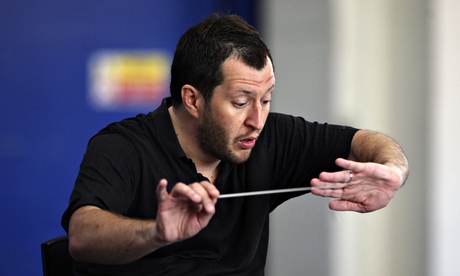
The City of Birmingham Symphony orchestra worked regularly with Thomas Adès when he was artistic director of the Aldeburgh festival, but they last appeared together six years ago. Adès's return to Symphony Hall showed that his rapport with the orchestra is still there, and that his knack of devising programmes that are both attractive and innovative is as potent as ever. At the centre of this concert, framed between Ravel's Mother Goose ballet and Adès's own Tevot, were two UK premieres, both works for piano and orchestra composed for Nicolas Hodges, who was the soloist here.
Gerald Barry's Piano Concerto is typically irreverent, but typically affectionate too. It takes conventional concerto rhetoric and stands it on its head, cramming it into a 25-minute single movement as a careering series of no-holds-barred confrontations between the piano, with its weaponry of forearm clusters, torrents of repeated notes and rare precious moments of utter calm, and an orchestra that can muster rampaging brass, raucous woodwind and, at the breathtaking climax, a torrential toccata, with a couple of antiphonal wind machines thrown in too. It's surreal, funny, and just a bit breathless, but it's also a genuine virtuoso vehicle for Hodges, who played it with his usual unfussy brilliance.
Francisco Coll's concertino is completely different but equally compelling. Packing four movements and a cadenza into less than 15 minutes, it's apparently based on a Spanish folk dance, though that's hard to hear, and comes with a subtitle, No Seré Yo Quien Diga Nada (I'm not saying nothing) which hints at a subtext about the role of a leader in a modern mass culture. Without any of that, though, it's still an elegant, feisty showpiece, full of vividly imagined ideas and quicksilver changes of direction and mood, through which the soloist cavorts like a high-wire artist, over an orchestra (without violins or violas) which comments on and supports its act.
• Repeated at the Aldeburgh festival on 21 June. Box office: 01728 687110.

